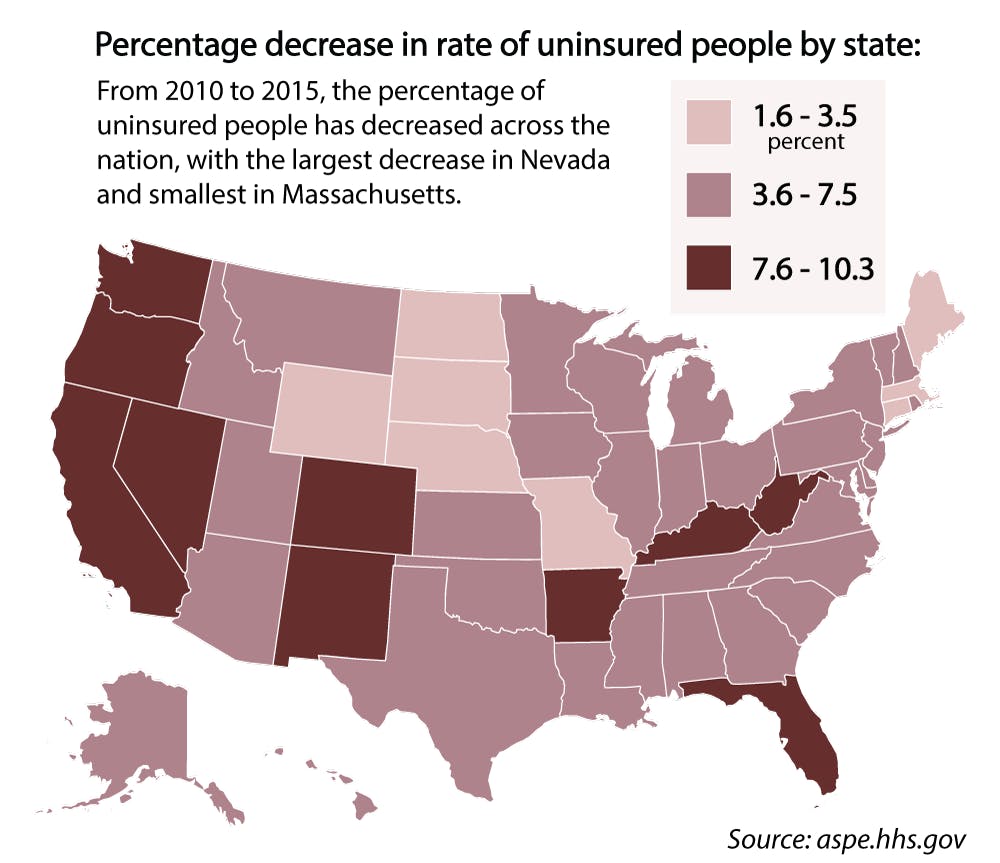Within hours of his inauguration, President Donald Trump set forth an executive order to roll back the Affordable Care Act, commonly known as Obamacare, potentially impacting thousands in Rhode Island. Now, doctors at the Alpert Medical School worry about what their patients stand to lose.
If the health law is repealed, 79,000 Rhode Islanders may lose health insurance coverage and 10 percent of the state’s population would be put at risk, said Dr. Nitin Damle, president of the American College of Physicians and clinical assistant professor of medicine at the Med School. An additional 165,000 non-elderly adults could be declined coverage because of pre-existing conditions, he added
Dr. Ira Wilson, chair of health services, policy and practice at the School of Public Health, expressed concern over the consequences a repeal would have on Rhode Island’s economy. Like many other states across the nation, Rhode Island receives “a whole raft of economic benefits — some direct, some indirect — from (Obamacare),” Wilson said. He added that Obamacare drastically improved coverage rates and increased revenue as a result.
Wilson supported the expansion of the Medicaid program in states like Rhode Island, which increased its coverage under Obamacare. He added that Rhode Island’s official healthcare exchange, HealthSource RI, has insured roughly 35,000 people in the state.
When more Rhode Islanders use health care, further revenue goes back to state institutions, ranging from hospitals to home care agencies. With a surge in revenue, these institutions “hire people, and the people they hire pay taxes,” he said. “There are these trickle-down economic and multiplier economic benefits that are accrued from a state like this.”
Additionally, Wilson worried about the impacts for Rhode Island’s most at-risk populations. Under Obamacare, “the rate at which people became insured preferentially benefited underrepresented minorities because they are highly represented in the poor,” Wilson said. Should the 20 million people under the health law lose insurance, those most at risk are low income populations — often racial and ethnic minorities.
Dr. Amal Trivedi, associate professor of health services, policy and practice and associate professor of medicine, raised similar concerns. He said that a repeal of the health law would “put their access to medical care at risk (while) also leading to potentially catastrophic out-of-pocket expenses for those who are uncovered.”
While President Trump’s executive order backs the steps that Congressional Republicans have already taken to dismantle Obamacare, the health law’s ultimate form remains unknown. Some physicians like Damle hope a replacement will retain key aspects of Obamacare. Specifically, Damle valued keeping young adults on their parents’ insurance and continued coverage for those with pre-existing conditions.
“Though some have said that this replacement plan is supposed to cover as many people (as possible), have more generous coverage and cost less for the government, I tend to view a plan that can do all three of those things very skeptically until I can see the details,” Trivedi said.
While some object to the future repeal of Obamacare, Kelly Conway, president of the Brown College Republicans, rejects Obamacare on constitutional grounds. “I don’t think the solution to bad insurance companies is to become a health care provider through the government.”
Trump’s administration wants “to enact mechanisms to make treatments prices more transparent,” Conway said. “How they’re going to do that, I don’t know, but if they can find a way to do it, I think it would be beneficial.”
Correction: A previous version of this article had the title "Med School professors express concern over Obamacare repeal." In fact, some of the professors interviewed for the article hold primary faculty appointments in the School of Public Health, which is separate from the Alpert Medical School. The Herald regrets the error.





